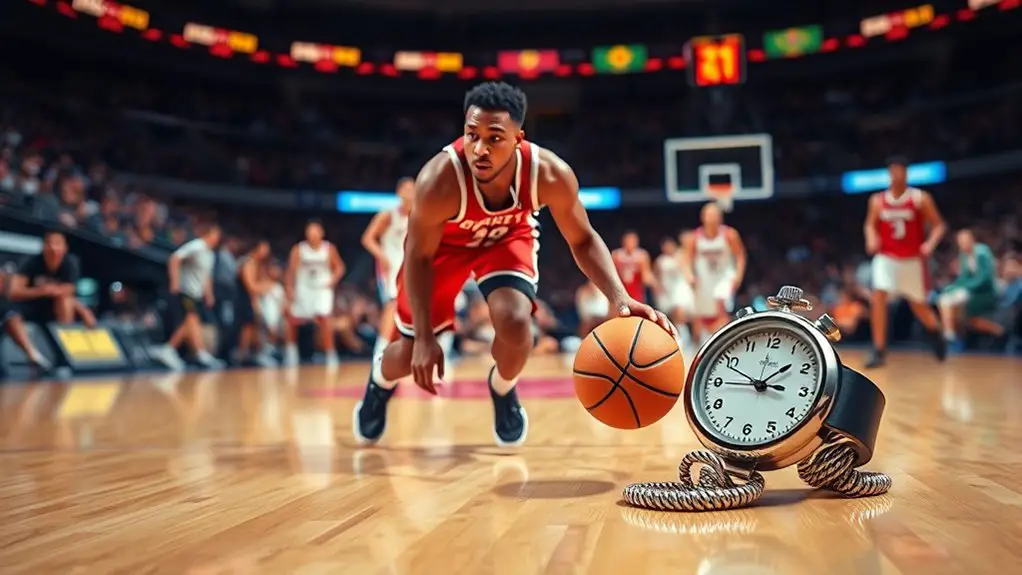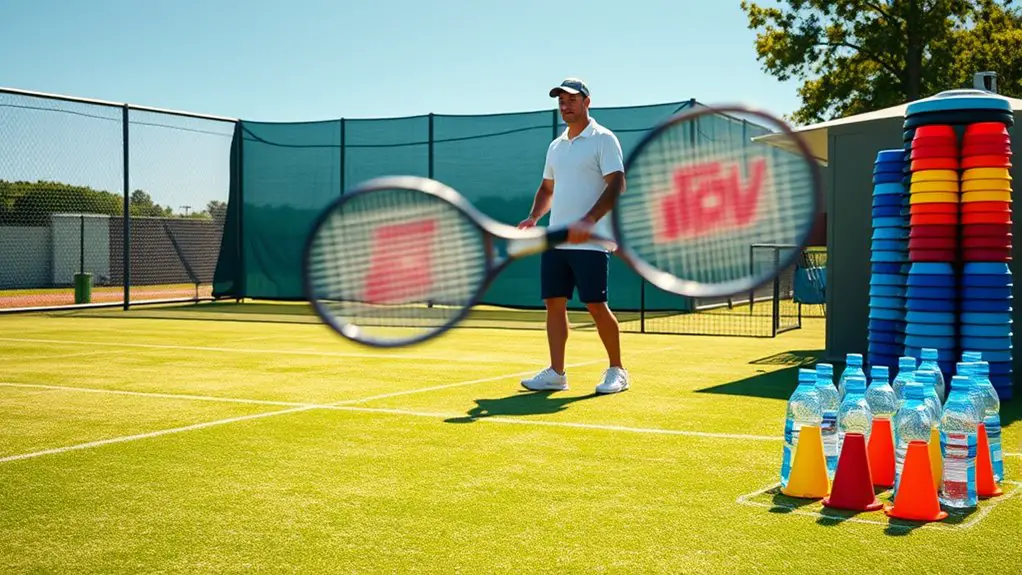To develop quick decision-making on the pitch, start by understanding your position and role clearly. Analyzing game situations helps improve your situational awareness. Practice visualization techniques to anticipate moves and outcomes. Enhance communication with teammates through clear signals and non-verbal cues. Engage in drills that boost your mental agility and reaction time. Finally, review past performances to learn from experiences. Stick around, and you'll discover more valuable tips to sharpen your decision-making skills.
Understand Your Position and Role
Understanding your position and role on the pitch is essential for effective teamwork and decision-making. When you grasp your position awareness, you're not just a player; you're a crucial part of a dynamic unit. Role clarity helps you know what's expected of you, allowing you to play with freedom and confidence.
Picture this: you're in the heat of the game, and you recognize where you should be, what your teammates need, and how to respond. This awareness transforms you from a passive participant into an active contributor, capable of making quick decisions that elevate the entire team.
Embrace your strengths, communicate openly with your teammates, and don't hesitate to adjust when necessary. The more you understand your role, the more fluidly you can adapt to the game's rhythm. Ultimately, it's about creating a harmonious environment where everyone thrives, and that starts with you knowing your place. Additionally, understanding your triggers can further enhance your decision-making by minimizing distractions that may impede your performance.
Analyze Game Situations
While you're on the pitch, analyzing game situations becomes essential for making quick, effective decisions. Understanding game dynamics and maintaining situational awareness can greatly improve your ability to respond rapidly. Here's a simple table to help you grasp the aspects to take into account during gameplay:
| Situation | Key Considerations |
|---|---|
| Offensive Attack | Space, defenders' positions |
| Defensive Setup | Opponent's movement, threats |
| Shift Phase | Speed, available support |
| Set Pieces | Timing, positioning |
Incorporating mental alertness into your training can also enhance your decision-making ability during gameplay.
Improve Your Knowledge of the Game
To make quick decisions on the pitch, expanding your knowledge of the game is essential. By diving into game theory, you can understand the underlying principles that drive player movements and strategies. This knowledge helps you anticipate what opponents might do, allowing you to react swiftly.
Tactical analysis is another critical aspect. Study different formations, plays, and styles of play to see how they affect the game's flow. When you grasp these tactics, you'll be better equipped to make informed choices under pressure.
Consider watching games with a critical eye, discussing strategies with teammates, or even analyzing your own performance. The more you understand how the game works, the more freedom you'll have to make decisions that align with your instincts. Knowledge empowers you to think on your feet and adapt, making quick decision-making a natural part of your game. Additionally, practicing mindfulness in athletic performance can enhance your ability to remain focused during high-pressure situations.
Practice Visualization Techniques
To enhance your decision-making on the pitch, practicing visualization techniques can be a game-changer. By incorporating mental imagery exercises, scenario simulation drills, and mindfulness techniques, you can sharpen your focus and response time. Let's explore how these methods can help you anticipate plays and react swiftly in high-pressure situations. Additionally, engaging in mental practice can improve muscle memory and coordination, further aiding your quick decision-making skills.
Mental Imagery Exercises
Mental imagery exercises can greatly enhance your decision-making on the pitch, as they allow you to visualize game scenarios and your responses to them. By engaging in these practices, you can reveal numerous visualization benefits, leading to better performance and confidence. Here are three effective imagery techniques to try:
- Game Scenario Visualization: Picture yourself in specific match situations, focusing on your decisions and movements.
- Positive Outcome Imagery: Visualize successful plays, boosting your confidence and reinforcing your skills.
- Role-Playing: Imagine yourself in various positions or roles on the team, enhancing your adaptability and understanding of the game.
Incorporating these exercises into your routine can free your mind, allowing for quicker, instinctive decisions when it matters most.
Scenario Simulation Drills
While engaging in scenario simulation drills, you can effectively practice visualization techniques that enhance your decision-making skills on the pitch. By setting up role playing scenarios, you can immerse yourself in various game situations, allowing you to visualize the plays, anticipate opponents' moves, and react instinctively. This active practice boosts your confidence and sharpens your awareness during real matches.
Incorporate game situation analysis into these drills by reviewing past performances and identifying critical moments where decisions could've been improved. As you visualize these scenarios, you'll cultivate a quicker, more intuitive response to the evolving dynamics of the game. Embrace this freedom to explore different strategies, and you'll find yourself making smarter decisions under pressure.
Mindfulness and Focus Techniques
Although the chaos of a match can be overwhelming, practicing mindfulness techniques can ground you and enhance your focus. By incorporating mindful breathing and focus exercises into your routine, you can sharpen your decision-making skills and remain present on the pitch. Here are three effective strategies:
- Mindful Breathing: Spend a few moments before and during the game taking deep breaths. This helps center your thoughts and reduces anxiety.
- Focus Exercises: Practice short bursts of concentrated attention, like focusing on a specific player or the ball, to train your mind to maintain clarity.
- Visualization: Picture yourself in game situations, making quick decisions, and executing plays successfully. This mental practice prepares you for real-time action.
Embrace these techniques for greater freedom in your performance!
Enhance Communication With Teammates
Effective communication with your teammates can make all the difference on the pitch. By establishing clear signals, using non-verbal cues, and fostering open dialogue, you can enhance coordination and decision-making. Let's explore how these strategies can elevate your game and create a more cohesive team.
Establish Clear Signals
To enhance communication with your teammates on the pitch, establishing clear signals is essential. Signal clarity helps everyone understand intentions quickly, fostering a sense of freedom and fluidity in your gameplay. Here are three ways to create effective signals:
- Visual Cues: Use hand gestures or body movements to convey plays without shouting.
- Consistent Signals: Develop a set of signals that everyone agrees on, ensuring they're easy to remember and recognize.
- Practice Regularly: Reinforce these signals during practice so they become second nature, allowing you to focus on the game rather than figuring out what each signal means.
Utilize Non-Verbal Cues
While verbal communication can be essential on the pitch, non-verbal cues often hold just as much power in conveying your intentions to teammates. Your body language can send silent signals that reveal your next move or alert teammates to potential plays. For instance, a quick glance or a nod can indicate where you want the ball or when you're making a run. By mastering these non-verbal cues, you create a seamless flow of communication that doesn't rely on words, allowing for quicker decisions. Remember, the right posture can show confidence and readiness, while an open stance invites collaboration. Embrace these subtle yet powerful tools to enhance your team's dynamics and elevate your game.
Foster Open Dialogue
Building strong communication among teammates isn't just about sharing strategies; it's about fostering an environment where everyone feels comfortable expressing their thoughts and ideas. To enhance this open dialogue, focus on a few key practices:
- Active Listening: Make sure you truly hear what your teammates are saying. This builds trust and encourages more honest conversations.
- Constructive Feedback: Share insights that can help each other improve. This fosters growth and helps everyone feel valued.
- Encourage Participation: Invite everyone to share their opinions and ideas. A diverse range of thoughts can lead to quicker, more effective decisions on the pitch.
Develop Mental Agility Through Drills
Since quick thinking is essential on the pitch, developing mental agility through specific drills can make a significant difference in your performance. Embrace drill variety to stimulate your mind and enhance cognitive flexibility, allowing you to adapt swiftly during games. Here are some drills to evaluate:
| Drill Type | Focus Area | Outcome |
|---|---|---|
| Reaction Drills | Speed of Thought | Faster decision-making |
| Small-Sided Games | Team Dynamics | Improved communication |
| Pattern Recognition | Anticipation | Better situational awareness |
| Role-Playing | Versatility | Enhanced adaptability |
| Scenario Training | Game Situations | Quicker tactical responses |
Each drill helps you break free from rigid thinking, empowering you to seize opportunities and navigate the game with confidence. Additionally, fostering mental toughness is crucial as it allows you to maintain composure and determination during high-pressure situations. Challenge yourself and watch your decision-making flourish!
Learn From Experience and Review Performances
To truly improve your decision-making on the pitch, it's crucial to learn from your experiences and regularly review your performances. Engaging in performance analysis helps you identify patterns and areas for improvement. Here are three ways to make the most of your experiences:
- Analyze Game Footage: Review recordings of your matches to spot decision-making successes and mistakes. This visual feedback can be eye-opening.
- Share Experiences: Discuss your gameplay with teammates or coaches. Their insights can provide fresh perspectives, and you can learn from their experiences too.
- Reflect on Key Moments: After each game, take a moment to think about critical decisions you made. Consider what worked, what didn't, and how you can adapt in future situations. Embracing mental toughness allows you to thrive when stakes are high and enhances your ability to make quick decisions under pressure.
Stay Calm Under Pressure
When the game gets intense, staying calm under pressure can make all the difference in your decision-making. By mastering stress management techniques, you'll find that clarity emerges amidst chaos. One effective way to achieve this is through breathing techniques. When you feel overwhelmed, take a moment to breathe deeply. This simple action can ground you and enhance your focus. Additionally, embracing vulnerability allows for authentic self-expression can help you feel more at ease in high-pressure situations.
Here's a quick guide to help you stay calm:
| Technique | Description |
|---|---|
| Deep Breathing | Inhale for 4 seconds, exhale for 4. |
| Visualization | Picture a successful play. |
| Positive Affirmations | Remind yourself of your skills. |
| Focus on the Present | Concentrate on the current play. |
| Short Breaks | Take quick mental breaks when possible. |
Frequently Asked Questions
How Can I Improve My Reaction Time on the Field?
They say, "The early bird catches the worm." To improve your reaction time on the field, focus on reaction drills that challenge your reflexes. Incorporate speed training into your routine, like sprints or agility exercises, to enhance your overall quickness. Mix in some plyometric workouts, too. The more you train your body to respond swiftly, the more freedom you'll have to make those vital plays when it counts the most!
What Mental Exercises Boost Decision-Making Skills?
To boost your decision-making skills, try incorporating visualization techniques and cognitive drills into your routine. Picture yourself in various scenarios, making quick, effective choices. This mental rehearsal helps build confidence and clarity. Engage in cognitive drills that challenge your brain, like puzzles or reaction games, to sharpen your thought processes. By regularly practicing these exercises, you'll gain the freedom to make faster decisions when it truly counts, enhancing your overall performance.
How Does Nutrition Affect Decision-Making Abilities?
Nutrition plays an essential role in your decision-making abilities. When you time your meals right, you can enhance cognitive performance greatly. Eating balanced meals with the right nutrients fuels your brain, helping you think clearer and faster. If you're missing out on proper nutrition, it can slow your mental agility, making decision-making tougher. So, prioritize your diet, and you'll find your ability to make quick choices improves, giving you more freedom on and off the field.
Can Mindfulness Practices Help in Quick Decision-Making?
When it comes to quick decision-making, you can't afford to be caught flat-footed. Mindfulness techniques can greatly enhance your focus, allowing you to stay present and make better choices in the moment. By practicing mindfulness, you'll sharpen your awareness and clarity, giving you the freedom to react swiftly and effectively. So, if you want to elevate your decision-making skills, incorporating these practices into your routine is definitely worth a shot.
What Role Does Confidence Play in Making Quick Decisions?
Confidence is essential when you're making quick decisions. Your self-belief impacts how you handle pressure; if you trust yourself, you're more likely to act decisively. When the stakes are high, that inner confidence lets you embrace freedom in your choices, rather than hesitating. You've got to remember that every decision can lead to growth, so don't let doubt creep in. Embrace your abilities, and you'll find clarity even in intense situations.




